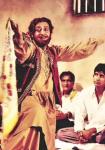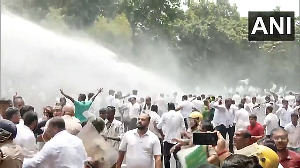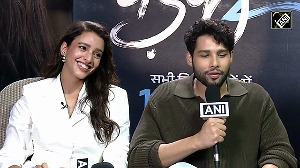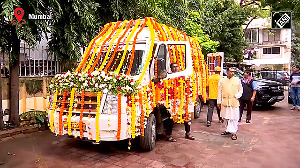 ‘A progressive judgment could have moved India forward, given hope to millions of young homosexual men and women, by telling them that there is nothing wrong with them, their feelings and emotions are fine, that it is natural and alright for them to be attracted to people of their own gender and to express love as they wish to.
‘A progressive judgment could have moved India forward, given hope to millions of young homosexual men and women, by telling them that there is nothing wrong with them, their feelings and emotions are fine, that it is natural and alright for them to be attracted to people of their own gender and to express love as they wish to.
‘But instead, the Wednesday ruling does not protect the rights of a large minority. And that is indeed shameful and hugely disappointing,’ writes Aseem Chhabra.
In November 2010 I attended the Queer Pride Parade in Delhi. The short route of the parade was set around the periphery of Connaught Place. There were about 2,000 people, young men, women, transgenders, and many couples -- gay and straight, and some with little children.
I have attended many gay pride parades in New York City, which bring hundreds of thousands of people to the streets of Manhattan. By comparison the Delhi pride parade was small. It was held one year after the Delhi high court had struck down the antiquated Section 377 of the Indian Penal Code that criminalised same sex relationships between consenting adults. And it was like a one big party on a beautiful November afternoon. There was so much joy among the parade participants.
Many courageous young men and women were not wearing masks and carried creative placards that read: ‘Closets are for Clothes’, ‘Queer Rights are Human Rights’, ‘No Need for Homophobia, Lesbian Suicides, Forced Marriages’, ‘Jab Pyaar Kiya To Darna Kya’.
And in the midst of the parade I saw two women -- one in her fifties and the other in her seventies with a young man dressed in kurta. The two women were also carrying placards with special messages. One read: ‘God Blessed Me with 2 Sons. 1 of Dem is Gay and I Love Both of Dem Equally!’ And other’s placard read ‘I Am Proud to Say My Grandson is Gay!’
On Wednesday two Supreme Court judges, Justices G S Singhvi and S J Mukhopadhaya, overruled the Delhi high court’s decision and upheld the constitutionality of Section 377. And in doing so, they virtually told those two women that their adult son is a criminal who commits illegal acts if he desires another man and expresses his love in the privacy of his home. That it is not okay for them to love, protect and encourage their son to live a life that seems natural to him.
Nature made that man gay and he must have gone through years of struggle to come to terms with who he is. But the Supreme Court verdict has made him head back into the closet and wait for the politicians to decide on his fate. Until then he better not declare he is gay or else he could be thrown into jail for committing a crime.
It is a shameful day for India. The country has been expressing its desire to be among the leading nations of the world -- joining the elite nuclear club, sending a mission to Mars, opening its doors (albeit rather slowly) to foreign investments. There are malls exploding across the country. To some these are symbols of a sparkling, shining India. At least in the urban parts of the country there is greater social acceptability of couples holding hands, kissing, living together out of wedlock. And in cities there are many gay and lesbian couples openly living together in love.
But the Supreme Court ruling has thrown the country back into the dark ages. As author Vikram Seth said, “We have all lost as Indians today!”
Living a life as a gay, lesbian, transgender or bisexual is not easy no matter where in the world the person is. In the US we often hear of tragic suicides by young men and women who cannot cope with the confusion about their sexuality and are sometimes bullied by their peers. We are shocked when these tragedies happen, and then greater efforts are made to reach out to others who may be struggling.
I cannot even begin to imagine how many millions of young men and women in India are struggling on a daily basis, confused about their sexual feelings, hiding their emotions and desires that are natural to them. Their parents mostly do not understand them, neither do their friends and the society around them. In a world connected through the Internet, they search for images, words, or any form of encouragement and compassion that would make them feel okay about themselves.
Many young men and women face these problems across the world, but more so in traditional and conservative societies. In India this problem is even larger, given that substantial part of its population lives in smaller towns and rural areas. The country’s social norms are often dictated by conservative religious groups and self-appointed gurus like Baba Ramdev, who seems to have solutions for everything -- from curing cancer, HIV, homosexuality to producing male children.
A progressive judgement could have moved India forward, given hope to millions of young men and women, by telling them that there is nothing wrong with them, their feelings and emotions are fine, that it is natural and alright for them to be attracted to people of their own gender and to express love as they wish to.
But instead, Wednesday's ruling does not protect the rights of a large minority. And that is indeed shameful and hugely disappointing.
I know the struggle will continue in India. There are activists like Ashok Row Kavi who launched Humsafar Trust in the 1990s and gave hope to so many gays, lesbians and transgenders by letting them know they were not alone. And there are activists like Anjali Gopalan whose organisation Naz Foundation was one of the leading groups to challenge the legality of Section 377.
And I have a feeling that the mother and grandmother of that young gay man will also join the fight. Their support is essential.
Image: In the November 2010 Delhi queer parade I saw two women -- one in her fifties and the other in her seventies with a young man dressed in kurta, says Aseem Chhabra. The two women were also carrying placards with special messages. One read: ‘God Blessed Me with 2 Sons. 1 of Dem is Gay and I Love Both of Dem Equally!’ And other’s placard read ‘I Am Proud to Say My Grandson is Gay!’ On Wednesday, however, two Supreme Court judges, Justices G S Singhvi and S J Mukhopadhaya, overruled the Delhi high court’s decision and upheld the constitutionality of Section 377. And in doing so, they told those two women that their adult son is a criminal who commits illegal acts if he desires another man and expresses his love in the privacy of his home. Photograph: Myna Mukherjee.











